In Japanese, ~ku ~く is the ending of i-adjectives when conjugated to their ren'youkei 連用形, i.e. the ~ku suffix is the adverbial form of the ~i ~い copula. It's similar to the "~ly" suffix that turns adjectives in adverbs in English, e.g. if sugoi すごい means "incredible," then sugoku すごく means "incredibly," although it may translate to the bare form when it expresses the final state of a process. It can also be used to connect multiple adjectives to each other. In rare cases, ~ku is used in a manner similar to a noun describable by the adjective. For example:
- {karuku} takaku
軽く叩く
To hit [something] {lightly}.
To hit [something] {in a way that is light}.
- karui
軽い
Light. As in not "heavy," omoi 重い. Not to be confused with a sparkling "light," hikari 光.
- karui
- {karuku} naru
軽くなる
To become {light}. - {{takaku} hayai} kuruma
高く速い車
A car that {{is expensive and} fast}.
- takai
高い
High. (height.)
Expensive. (price.)
- takai
- tooku φ e nigeru
遠くへ逃げる
To escape to [a place that] is far away.
- tooi
遠い
Far. Antonym of chikai 近い, "near."
- tooi
Manga: Doll-Kara, どるから (Chapter 1)
Manga: Jahy-sama wa Kujikenai!, ジャヒー様はくじけない! (Chapter 0.1)
Grammar
See the article about i-adjectives for general grammar about i-adjectives, conjugation. This article is mainly about the suffix found in the ren'youkei.
Adverbial Copula
The ~ku ~く morpheme has a function analogous to the ni に adverbial copula, which would be the ren'youkei of the da だ copula used with na-adjectives and no-adjectives (nouns), therefore, it follows that ~ku is an adverbial copula, too. Observe:
| shuushikei 終止形 | ren'youkei 連用形 | |
|---|---|---|
| i-adjective | Tarou ga hayai 太郎が速い Tarou is quick. |
{hayaku} hashiru 速く走る To run {quickly}. |
| na-adjective | Tarou ga shoujiki da 太郎が正直だ Tarou is frank. |
{shoujiki ni} iu 正直に言う To speak {frankly}. |
| no-adjective | Tarou ga koukousei da 太郎が高校生だ Tarou is a high-schooler. |
{koukousei ni} naru 高校生になる To become {a high-schooler}. |
If a phrase seems difficult to understand, generally you can paraphrase it as "to do something in a way that is...," e.g. "to run {in a way that is fast}."
- Context: Jahy-sama works as a waitress.
- oneechan, kocchi mo nama-chuu futatsu ne
おねーちゃん こっちも生中2つね
Missy, two beers here, too.- oneesan お姉さん - "older sister," may also be used to refer to a young girl.
- ~chan ~ちゃん - diminutive of ~san ~さん honorific.
- nama-chuu - from nama-biiru 生ビール, "raw beer," as in "draft beer," in a a jug of "medium," chuu 中, size.
- gaya gaya
ガヤガヤ
*noisy crowd.* - oneechan!? {ki-yasuku} yobi-otte! ware wo dare da to omotte-iru
おねーちゃん!?気やすく呼びおって!我を誰だとおもっている
Missy?! Calling [me] so casually! Who does [he] think I am?- ki-yasui - relaxed, familiar, casual, as opposed to formal.
- yobi-otte - te-form of yobi-oru 呼びおる.
- ~oru suffixed to the ren'youkei 連用形 of a verb works similarly to ~yagaru ~やがる, used to say someone "dares" to do something to you, expressing angers or amazement.
- {ki-yasuku} yobu - to call [her] {in a way that is relaxed, familiar, casual}.
- nama-chuu futatsu na
生中2つな
Two beers, right? - pi, pi
ピピ
*writing down.* - ware wa makai nanbaa tsuu no Jahii-sa...
我は魔界No.2のジャヒーさ・・・
I['m] the demon world's number two, Jahy-sa...
- Here, Jahy was about to call herself Jahy-sama. You don't normally use honorific suffixes toward yourself, specially the respectful ~sama ~様, as it sounds pompous. This is typically done by characters that are extremely proud, over-confident, or bossy.
- nanbaa tsuu, the katakanization of "number two," was used as furigana for its abbreviation.
- neechan, kocchi mo~
ねーちゃんこっちもー
Missy, here too~ - a'!? hai!
あっ!?はい!
Ah? [One second]!- hai - "yes," used as an affirmative response in general.
This is particularly clear in the ergative verb pair naru なる and suru する, "to become" and "to make become," respectively, where the phrases ~ni naru ~になる and ~ni suru ~にする used with na-adjectives and no-adjectives have ~ku naru ~くなる and ~ku suru ~くする counterparts for i-adjectives.
- kuruma ga {hayaku} naru
車が速くなる
The car becomes {quick}.
The car becomes {fast}. - kuruma wo {hayaku} suru
車を速くする
To make a car become {fast}.
To make a car go vrooom.- kuruma wo {hayaku} dekiru
車を速くできる
To be able to make the car become {fast}.
- kuruma wo {hayaku} dekiru
Note that ~ku doesn't translate to the bare form (i.e. as a flat adverb) in English only with naru and suru.
- {atsuku} moeru
熱く燃える
To burn {hot}. (to end up hot by burning.) - {fukaku} shizumu
深く沈む
To sink {deep}. (to end up deep by sinking.)
At Sentence End
When a sentence ends in ~ku ~く, it's most likely an incomplete sentence ending in the adverb and missing its main verb, which is likely naru, but could be something else. For example:
- Context: Tetsutetsu Tetsutetsu 鉄哲徹鐵, whose body turns into "iron," tetsu 鉄, explains why he is the one to face Todoroki Shouto 轟焦凍 in battle, who can use fire.
- kikanee kara da yo
効かねェからだよ
Because [it] doesn't have effect!
Because the fire doesn't work on me!- kiku
効く
To have effect.
- kiku
- kondo a Tetsutetsu ga chinchin da yo oi...!!
今度ァてつてつがチンチンだよオイ・・・!!
Tetsutetsu is chinchin(※see note below) now, oy...!!- kondo - "this time," "now."
- a ア - contraction of the wa は particle.
- shuuu
シュウウ
*vapor fuming* - ※ichibu chiiki de "atsu-atsu" no koto da kara ne!
※一部地域で“熱々”のことだからね!
※In a certain region [it] means "atsu-atsu" [you see]!- atsu-atsu, "very hot" - intensifying reduplication of atsui 熱い, "hot."
- “” - quotation marks.
- netsu de {akaku} [natta]...!
熱で赤く・・・!
[He] [became] {red} with heat...!
Alternatively, it could be a dislocation:
- hashire! {motto {hayaku}}!!!
走れ!もっと速く!!!
*Run! {More {fast}}!!! (literally.)
Run! Faster!!!
- {motto {hayaku}} hashire
もっと速く走れ
?Run {more {fast}}!!!
- {motto {hayaku}} hashire
Some adverbs commonly used without verbs:
- yoroshiku
よろしく
Used to say "nice to meet you," or "I'm happy to be working with you" when greeting someone for the first time (yoroshiku onegai shimasu よろしくおねがいします). From yoroshii よろしい, "good." - shikata naku
仕方なく
It couldn't be helped. From shikata ga nai 仕方がない, "there is no way to do [it]." - mattaku
全く
Good grief. From mattai 全い, meaning "complete."
Derived Forms
The past form of i-adjectives derives from the ~ku ren'youkei modifying the irregular verb aru ある.(Fujiyoshi, 1982:89) This derivation isn't obvious at first glance due to changes in pronunciation merging the resulting phrase. Observe:
- hayakatta
速かった
[It] was fast.- The unchanged stem would be:
- {hayaku} atta
速くあった
It existed {in a way that was fast}. (literally.)
The negative form derives similarly from nai ない, which is the irregular negative form of aru.
- hayakunai
速くない
[It] isn't fast.- hayaku plus ~nai.
- hayakunakatta
速くなかった
[It] wasn't fast.- Stem: hayaku naku atta.
Syntactically, the ~aru (~nai) of ~ku aru ~くある (~ku nai ~くない) is a hojo-doushi 補助動詞 (auxiliary verb). Similar syntax for the da だ copula is found in de aru である (de nai でない), a difference being that de で is the te-form of da, while ~ku isn't the te-form of ~i.
The te-form of i-adjectives is ~kute ~くて. It's possible that this is derived from ~ku, too, but I haven't been able to confirm it.
Before Particle
Like de aru and other hojo-doushi phrases, ~ku aru can be split into ~ku, some particle, then ~aru. Usually the wa は particle (e.g. ~ku wa aru ~くはある), or the mo も particle (e.g. ~ku mo nai ~くもない).
- hayaku wa aru ga, yasuku wa nai
速くはあるが、安くはない
Fast, [it] is, but cheap, [it] is not.
It's fast, but not cheap.
- c.f.:
- kirei de wa aru ga hitsuyou de wa nai
綺麗ではあるが必要ではない
Pretty, [it] is, but necessary, [it] is not.
It's pretty, but unnecessary.
- sabishiku mo nai
寂しくもない
[I] am not even lonely.
[I] am not lonely, either.
- c.f.:
- mijime de mo nai
惨めでもない
[I] am not even miserable.
[I] am not miserable, either.
- yoku mo waruku mo nani mo nai
良くも悪くも何もない
Not good nor bad nor anything.
Connective Copula
The ren'youkei can sometimes be used to connect multiple adjectives, like the te-form.
- {{chiisaku} kawaii} doubutsu
小さくかわいい動物
An animal [that] {{is small and} cute}.
A small, cute animal.
- {{chiisakute} kawaii} doubutsu
小さくてかわいい動物
- {{chiisakute} kawaii} doubutsu
Note that the last adjective must end in ~i, it can't end in ~ku. On the other hand, ~i can also be used to be used to chain multiple adjectives to a single noun.(Larson & Yamakido, 2003:3)
- ookii takai akai kuruma
大きい高い赤い車
Big, expensive, red car. - ookiku takai akai kuruma
大きく高い赤い車 - ookiku takaku akai kuruma
大きく高く赤い車 - *ookiku takaku akaku kuruma
大きく高く赤く車
Noun-Like Usage
Sometimes, a word ending in ~ku ~く appears to be used as a noun describable by the adjective. For example:(Larson & Yamakido, 2003:2, 5)
- Tarou ga {tooi} basho e itta
太郎が遠い場所へ行った
Tarou went to a place [that] {is far}. - Tarou ga tooku e itta
太郎が遠くへ行った - kono densetsu ga {furui} jidai kara aru
この伝説が古い時代からある
This legend exists since times [that] {are old}.
This legend exists since old times. - kono densetsu ga furuku kara aru
この伝説が古くからある - Hanako ni hagemashi no tegami ga ooku kara yoserareta
花子に励ましの手紙が多くから寄せられた
Letters of encouragement were sent to Hanako from many [people].
- ooi 多い, "many."
This usage isn't allowed with just any adjective. It has many restrictions. Only adjectives regarding time or space are allowed (e.g. chikai 近い, "near," asai 深い, "shallow," hikui 低い, "low," osoi 遅い, "late," wakai 若い, "young," and their antonyms).(Larson & Yamakido, 2003:3–4) Similarly, the noun-like ~ku only occurs marked by a spatiotemporal particle, such as kara から, "since," "from," made まで, "up to," "until," ni に, "to," or e へ, "toward."(ibid:5) Considering this, it's not a form of nominalization, instead, it's as if a spatiotemporal noun (e.g. basho, jidai) was omitted (elided), i.e. there's a spatiotemporal null pronoun after the word.(ibid:2) Exceptions exist: tooku 遠く and chikaku 近く can be marked as subject and object by the ga が and wo を, respectively, and by the no の particle to become no-adjectives (genitive case);(ibid:6) and ooku 多く, "many," can used like a noun, including with ga, wo, no, despite not being spatiotemporal, likely because the linguistic phenomenon allowing ooku to work is different from the one that allows tooku and furuku to work.(ibid:6, 13)
- sono paathii de ooku φ ga yopparatta
そのパーティーで多くが酔っ払った
Many [people] were drunk at that party.
Many φ were drunk at that party.
- φ - a symbol representing the null pronoun.
- Note that in English we can say "many were drunk" to mean "many PEOPLE were drunk."
- Many languages, including English, allow nominal ellipsis (the noun, e.g. "people," is omitted) with the words "many" and "much."(ibid:13, citing Sleeman, 1996)
- When you read a sentence like "the needs of many outweigh the needs of few" for some reason you always think "many people" and "few people," even though it could be "many rabbits," for example.
- Hanako ga sore ni tsuite ooku φ wo kataranakatta
花子がそれについて多くを語らなかった
Hanako didn't speak much about that. - *Tarou ga utsukushiku e itta
太郎が美しくへ行った
Intended: Tarou went to a beautiful place.- This is wrong because utsukushii 美しい, "beautiful," isn't a spatiotemporal adjective.
- *kono densetsu ga kuraku kara aru
この伝説が暗くからある
Intended: this legend exists since dark times.- This is wrong because kurai 暗い, "dark," isn't a spatiotemporal adjective.
- *Tarou ga hayaku no meethingu e itta
太郎が早くのミーティングへ行った
- This is wrong because the genitive case marker no の can't come after hayaku, c.f.:
- Tarou ga {hayai} jikan no meechingu e itta
太郎が早い時間のミーティングへ行った
Tarou went to the meeting of the time [that] {is early}.
Tarou went to an {early} meeting.
- tooku φ no machi
遠くの街
A town of a far [place].- This is allowed because the genitive case marker no の can come after tooku.
- chikaku φ no eki
近くの駅
The station of a nearby [place].- It's not the station that is near, it's the place where the station is located at that is near, which, naturally, consequently means that the station is near. Sounds a bit roundabout, doesn't it?
- Context: an old man saves a cat from truck-kun and ends up getting killed in the process. The cat, thankful, puts him in the body of a young girl, then explains the situation to him.
- sono karada ni tsuite wa {moushi-wake nai} to omotteru nya
その体については申し訳ないと思ってるニャ
About that body, [I] feel {sorry} meow.
I'm sorry about you ending up in that body, meow. - chikaku ni {tegoro na} nikutai ga nakute nya~~...
近くに手頃な肉体がなくてニャ~~・・・
There weren't any {suitable} bodies nearby, [you see], meow~~.- ~ga nakute na ~がなくてな - "there weren't [...], you see."
- {zan'nen da} kedo moto no karada ni wa mou modorenai nya
残念だけど元の体にはもう戻れないニャ
{It's unfortunate}, but you can't return to your former body anymore, meow.- modorenai - negative form of modoreru 戻れる, potential form of modoru 戻る, "to return."
- kimi no nikutai wa katsudou wo teishi shite-shimatta kara nya
君の肉体は活動を停止してしまったからニャ
Because your body has ceased activity, meow.
- You're dead, meow.
- ~wo teishi suru - "to cease," "to stop," suru-verb.
Homonyms
Some godan verbs end in ~ku ~く in their nonpast form, making their ending homonymous with the ~ku adverbial copula.
- Context: Kuga Yuuma 空閑遊真 knows your habits.
- omae...... tsuman'nai uso φ tsuku ne
おまえ・・・・・・つまんないウソ つくね
You...... tell boring lies, [don't you]?
- tsuman'nai - a contraction of tsumaranai つまらない.
- tsuku - "to spew," "to tell [lies]," a godan verb, not the ren'youkei of some *tsui
ついi-adjective.
Some contractions can be mistaken for the ~ku copula: ~teku ~てく (~deku ~でく), from ~te-iku ていく (~de-iku ~でいく), and ~toku ~とく (~doku ~どく), from ~te-oku ~ておく (~de-oku でおく).
- Context: a boy wants to buy a book, but it's out of stock.
- nandeshitara hairi shidai otaku e otodoke itashimashou ka
何でしたら入り次第お宅へお届けいたしましょうか
[If you want] [I] will deliver [it] to [your] house [as soon as] [it] enters [stock].- shidai
次第
Depending on. In this case, when he delivers the book depends on when it enters stock. As soon as.
- shidai
- sou shite kureru?
そうしてくれる?
[You] will do so for [me]? - daikin wa {{sono ba de harau} you ni} shitoku kara
代金はその場で払うようにしとくから
As for the payment, [I] will make [it] {so [that] {[it] is paid there}}.
- i.e. the payment will be ready at his home for when it arrives.
- ~you ni suru ~ようにする, "to make it so that [something happens]."
- ~you ni shite-oku ~ようにしておく, "to make it so that [something happens] in preparation for [something else]," e.g. he'll give his servants the money and instructions to pay the book so that when it arrives there it can be paid for there.
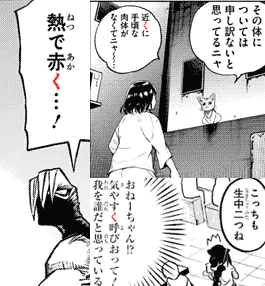
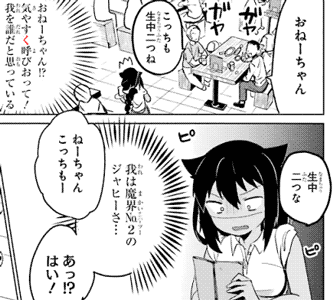
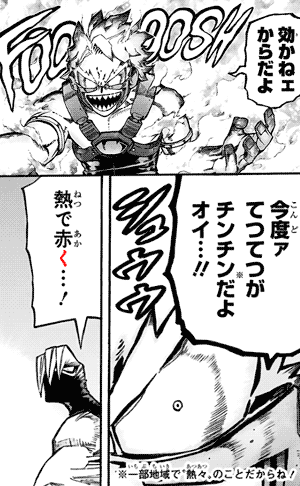
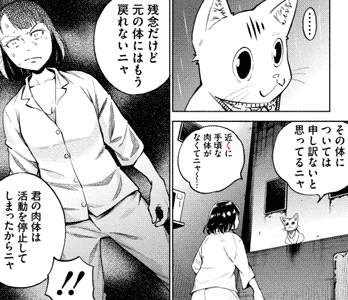

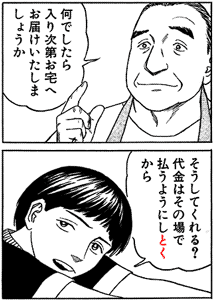
No comments: